That’s right, it’s time for my yearly Political Compass Test!
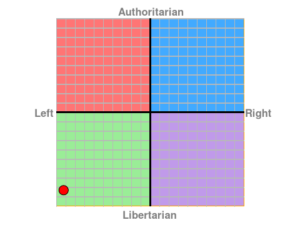
Almost identical to my result from last year – .25 deviation on one axis. Still pinker than raw chicken.
That’s right, it’s time for my yearly Political Compass Test!

Almost identical to my result from last year – .25 deviation on one axis. Still pinker than raw chicken.
Governmenting is hard work. Representing hundreds of thousands of people can’t be easy, what with those unwashed masses demanding ‘accountability’ and ‘doing your job’. Sometimes, what that job is might slip a representative’s mind. So, this Valentine’s Day, show you appreciate your U.S. Representative (or closest Republican rep) by sending them a gift. Here’s a suggestion:
All Representatives are sworn in, affirming that they “will support and defend the Constitution of the United States against all enemies, foreign and domestic; that I will bear true faith and allegiance to the same,” but maybe they don’t remember what that entails, or maybe they just haven’t read it. So get them a copy. It’s not an expensive gift (only $1.00 on Amazon!), but it’s the thought that counts. And don’t worry, I’m sure that if someone else decides to also get a copy for them, they have a few hundred staffers who could also use a copy, so don’t worry about duplicates.
Look, I have an idea. Let’s let the military handle policing.
What, that’s a bad idea? Yes, yes, I know about the Posse Comitatus Act. I know that “military occupation” isn’t exactly a happy thought. But hear me out here – this is actually a legitimate idea.
Let’s be clear, I’m not talking about the Army or the National Guard taking over for the police. I’m talking more about something like the Coast Guard. A new, separate branch of the military. It would have an organizational command structure just like any other branch, with ranks and chain of command. As police forces already have this, I’m not not talking about a huge organizational change at the local level. What I am talking about is a unified entity on a national scale.
Recruits would be drawn from every part of the country, assigned to a training base in a group, and trained as a whole. Initial training would be the same as the military, with less of an emphasis on unit tactics and weaponry. Recruits would be indoctrinated into the rules of military engagement, which are, quite honestly, more civilian-friendly than what’s being taught to the police currently roaming the streets. Once the physical aspect of the training was over, there would be a more intensive criminal justice training. Graduates from this 4-month boot camp would then be assigned to a one-year training cycle with a senior patrol training officer. Assignments would be nationwide, not likely from the recruit’s hometown. A large emphasis on community-based policing would be employed, with patrol officers building relationships.
Once the one-year assignment was up, recruits would become full-fledged patrol officers, and begin working their way up the various ranks. They would be eligible for relocation assignments. Police stations would become micro-bases, and the chain of command would follow up to the Pentagon level. Internal investigations would be handled by a Judge Advocate General, a body far-removed from the patrol level and with much more transparency and oversight.
Military-style force (SWAT interdictions) would require authorization and coordination above the local level – the local police chief wouldn’t be able to call up a tank without going up the chain of command.
Look, we operate military and peacekeeping forces in active warzones, where anyone can be a combatant, and we still wind up with less civilian casualties from ground units. We forge relationships on the ground to help the local populations. When shit gets real and bullets start flying, we have rules for our soldiers, and when they break those rules, they are punished. We don’t have that for our police. We don’t have police forces that integrate with the community. I live in a relatively affluent, largely white area, and I don’t know a single police officer. The ones I’ve interacted with have made me feel uncomfortable and I was just a possible witness. And I’m about as white as there is.
My point is that our individual police forces have failed many communities, particularly communities of color. For those communities, the police are already an occupying force, one that abuses them with impunity. Having the discipline, training, chain of command, transparency, and oversight of a military branch would turn policing into the community defense that it should be.
It’s safe to say there are some problems facing America right now, and here we are in the midst of a presidential election in a year where there is no incumbent running. There will be a change in leadership. This should be a time to reflect on the issues of the day, such as:
One would think that the sober heads in the Republican Party, who have spent the past 8 years dutifully providing loyal opposition, would be using their convention platform to outline their vision for tackling these issues.
But hey, why bother with that shit when you can devote time to addressing the indiscretions of a president who left office 15 years ago? I’m sure that other stuff will solve itself.
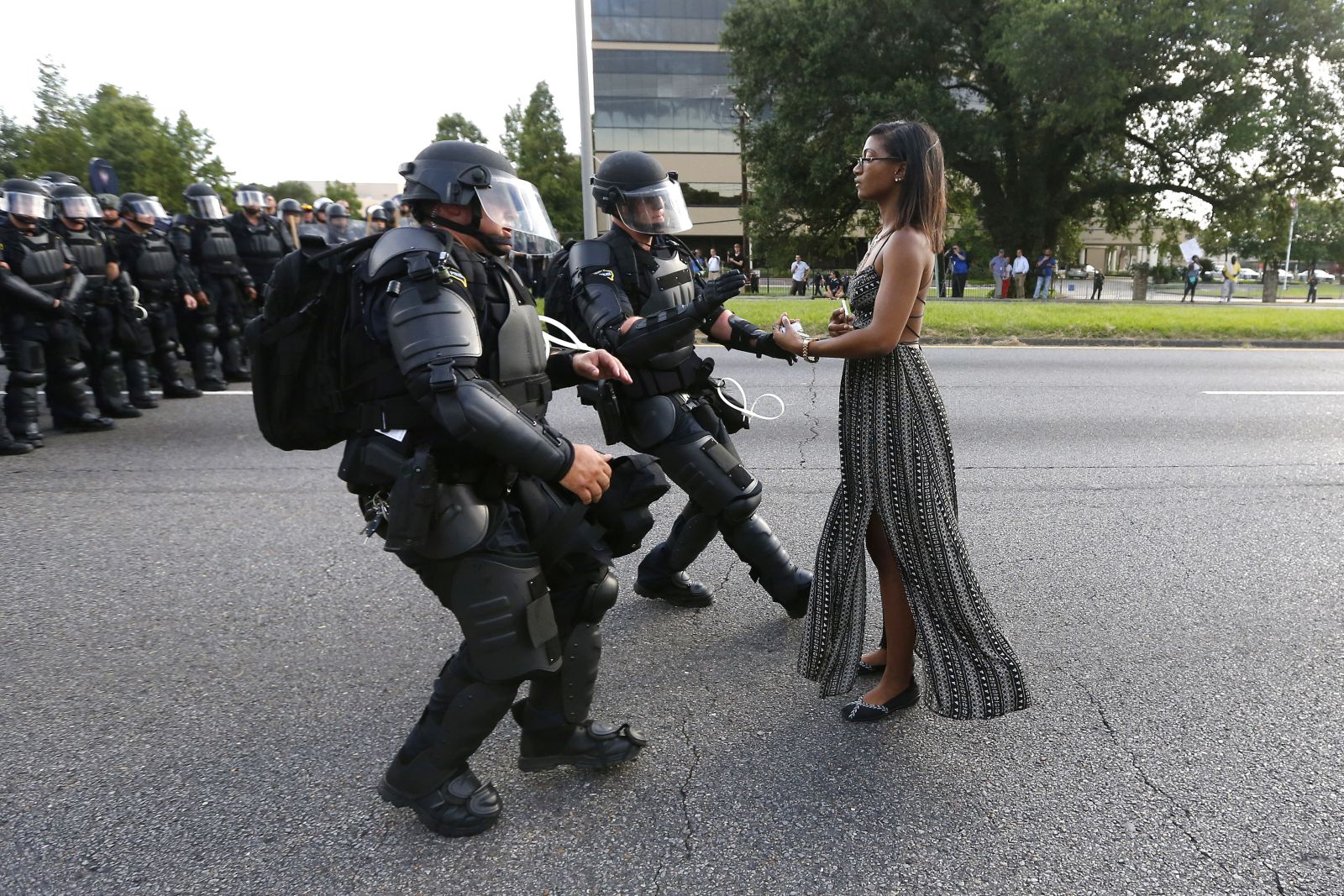
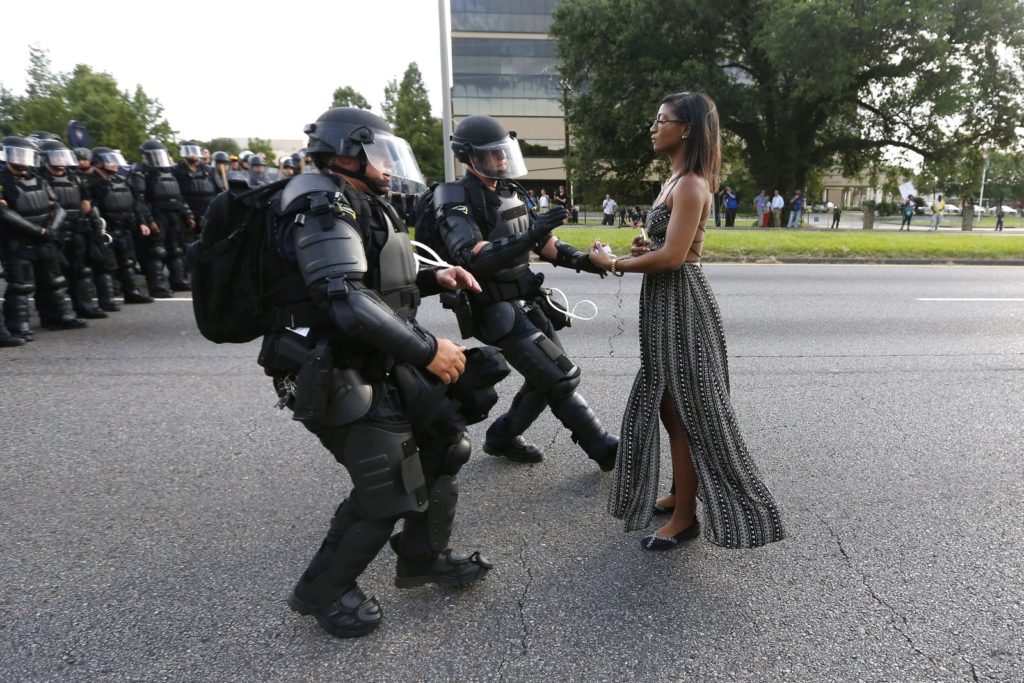
So much to unpack in this image. So terribly, terribly much. First off, Jonathan Bachman deserves a Pulitzer for this. I understand right place, right time, perfect timing on the shutter, but this is an iconic photo. Iesha Evans stands like a perfect statue of peace, eyes closed against the oncoming wave, arms crossed in front of her as if containing her power. Her dress is caught ever so lightly by the breeze, giving her an ethereal, almost angelic quality, as if she’s just landed. The riot officers, (thankfully) slowing, appear to be encountering her aura and repulsed by it.
That’s just the composition.
The reality is that Ms. Evans is about to be dragged down and zip-cuffed by two men more heavily armored than combat soldiers, men both nearly twice her size. She represents zero threat. No reasonable onlooker would conclude that she is armed. She is not in any way aggressive. She is peacefully protesting, but committing the ultimate crime of blocking a thoroughfare. For this, the police deemed greater than military force was necessary.
Putting aside that I’m presented with yet another peaceful civilian being brutalized by a police force unconcerned with “serve and protect” and fattened on years of cheap military surplus, I have a different problem with this image and what it represents. It’s almost too perfect. It might actually work. It might start to change public opinion about how policing is handled. That’s great, but my question is: why this one? Why this image? Why this woman?
Because we’re looking for Black Jesus.
These protests arose out of the general impression that minorities, particularly African-Americans, are assumed by the legal system to be guilty until proven innocent, unworthy of justice if they are, subject to summary punishment, that the system is unaccountable when it errs concerning their rights. I could recite a litany of names here, but it would seem incomplete because there will be another one horrifyingly soon. The largest issue is that even when the dead black (typically) man has done nothing to warrant roadside execution, the narrative always circles back to assume he somehow deserved it, somehow brought it on himself. Maybe he was a criminal a decade ago. Maybe he was rude. Maybe he had a toy gun. Maybe he was being suspicious.
In 1956, Rosa Parks was hauled off to jail for not giving up her seat on a bus. Her’s wasn’t the first case, in fact, there was already a case working through the legal system that would successfully end Montgomery’s bus segregation. But why were the women involved in that suit not raised up as icons of the Civil Rights movement like Parks was? The first one to be arrested, Claudette Colvin, well, she was 15 and girl had a mouth on her. She wouldn’t play well in the media. She wasn’t a good face for the movement. She wasn’t the Black Jesus they needed to show the injustice. Similarly, all of these people who’ve wound up dead after interacting non-violently with police have been somehow less-than-holy. Michael Brown may have robbed a store. Freddie Gray was packing a knife. Sandra Bland may have mouthed off to an officer. Eric Garner was selling cigarettes. Alton Sterling had a record. No qualifiers for Black Jesus there.
Now we have Philando Castille, who, by all accounts, was a model citizen. Gunned down without hesitation in his car after informing the officer that he was going to produce his permit to carry, Castille seems like the perfect person to hold up and say “this man did everything right.” He yielded to the officer when pulled over. He informed the officer that he was legally carrying. He followed all of the motions, and still wound up bleeding to death from multiple gunshot wounds.
But, like Jesus, he hung out with a woman who may have been less than the Blessed Virgin Mary herself, and if there’s one thing this Christian Nation cannot tolerate, it’s someone who is not white and less than perfect. So maybe he’s not our Black Jesus after all.
It’s possible that Iesha Evans is the Black Jesus of protesters. Maybe not. I’m sure we’ll hear in the coming days how she once got a B on a midterm or said a bad word once, or was in some way less than perfect, justifying her treatment in the scene in which she’s been immortalized. But maybe we need to stop looking for Black Jesus. Maybe we need to stop looking for that perfection and understand that we’ve already seen enough to know that there is brutal injustice going on in this nation. Half of the country lives in fear of the law, lives with a sense that they are not equal under the law, lives with examples that they can be refused justice without repercussions. Even if this is just a perception problem, it’s a problem. We need to stop looking for a savior to be crucified before our eyes to start working for salvation.
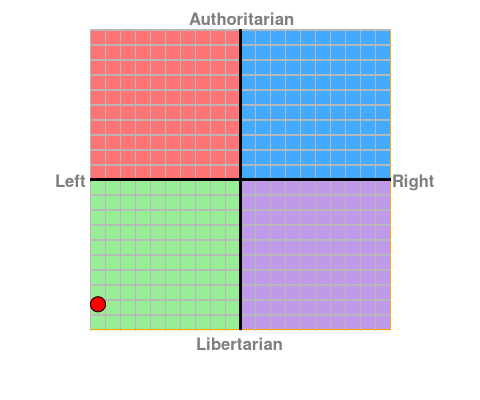
It’s May, so, once again, it’s time to check the oil on just where I stand on the Political Compass:
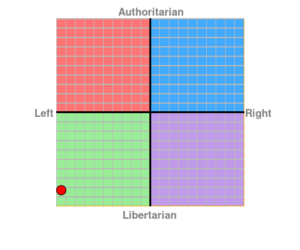 Economic Left/Right: -9.50
Economic Left/Right: -9.50
Social Libertarian/Authoritarian: -8.31
Practically the same score, three years in a row! That’s right, I am a pinko commie through and through!
Ahmed Mohamed was arrested for making a hoax bomb. That’s the official reason for his arrest. But that’s not why he was arrested. The why of why he was arrested is a little more complicated, but it boils down pretty succinctly to bigotry, xenophobia, and terrorism.
Let’s get a few things straight, this wasn’t a “post-9/11 overreaction.” This was a number of people actively taking their racism out on a 13-year-old boy. There was, at no point in the ordeal, an actual fear or even belief that he had made a bomb or even intended to make a device that people would believe was a bomb. Ahmed’s English teacher decided that it would be better to err on the side of lynching than let this opportunity to be a terrible example to the class pass by. Upon seeing the clock, the teacher declared that it looked like a bomb, despite Ahmed’s calm protests that it didn’t.
This teacher, this brave first responder, then had Ahmed taken out of class. Note that the teacher didn’t immediately call for a lockdown and evacuate the class. The teacher didn’t actually think that it was a bomb and the teacher at no point believed that there was any danger. The teacher was (to use the accurate terminology) a fucking asshole racist bigoted xenophobe who had found the perfect excuse to toss the local Muslim kid to the wolves. But the fun didn’t stop with Ahmed’s English teacher.
Upon being escorted to the office, highly not dangerous clock in tow, the police were called. Someone in the office called the police on a 13-year-old with a clock. They did not call the police and say HOLY FUCK THERE IS A BOMB HERE SEND HELP, because a few officers showed up in orderly fashion, not the entire bomb squad. Helicopters did not circle. Students were not evacuated. CNN was not on scene in minutes. No one at any time actually thought this was a bomb.
Ahmed, for his part, consistently maintained that he had made a clock. He did not mention to anyone that this was a device intended to emulate a bomb.
The police arrived, and began questioning Ahmed, who asked to speak to his parents. That request was denied, because he was “in the middle of an interrogation.” I understand that the maximum IQ for a police officer is at least 24 points lower than the minimum to get into Mensa, but even the most barely-functional police officer should know that this is a blatant violation of a person’s Constitutional rights. So it’s safe to say that the intent here was not to discern whether there was any threat here, it was to intimidate. The interrogation was simply to send the message “your freedom is at our whim.”
After the interrogation, this cooperative, whip thin 13-year-old boy, who could have been snapped like a twig by any of the officers, and that everyone knew was not building a bomb, was handcuffed, “for his safety and for the safety of the officers,” in full view of his peers, and frog-marched to the local precinct, where he was processed and charged with creating a hoax bomb.
He was wearing a NASA t-shirt. I don’t claim to know a lot of jihadis, but I can bet that none of them have screamed “DEATH TO AMERICA EXCEPT FOR YOUR SPACE PROGRAM!”
The charge was, of course, bogus, and quickly dismissed after social media turned up for the circus that the authorities were putting on. The media, for its part, immediately began pushing the narrative that Ahmed had been arrested for making a hoax bomb. But he wasn’t. He was arrested for being brown. The clock is even incidental here: when the first police officer saw him, his reaction was “Yup. That’s who I thought it was.” He wasn’t expecting the quiet white nominally-Christian boy who is far more likely to be a mass shooter. He was expecting Ahmed. They wanted to arrest the brown kid. They wanted to haul in the Muslim like he was a trophy.
There’s another part to this story, one that actually involves terrorism. Ahmed’s father is a political person. He’s a vocal opponent of anti-Islamic activity in America who happens to live in a town with a mayor who is leading the charge against “Sharia Law,” as if that’s actually a thing that is happening in America. He often returns to his native Sudan to run for president. He has debated notorious bigots. He’s outspoken in claiming his rights.
And now, seemingly out of nowhere, his son has been rounded up, had his rights violated, and been accused of egregious crimes that no one involved actually believes he intended to commit. They weren’t even polite enough to disguise it. “Yup. That’s who I thought it was,” the police said. They knew who this was. They knew what they were doing and who they were targeting. This arrest was an act of terrorism.
ter·ror·ism
ˈterəˌrizəm/
noun
- the use of violence and intimidation in the pursuit of political aims.
This was unambiguously the use of intimidation (and, it could be argued, violence), in the pursuit of political aims. It doesn’t matter that they tried to do it under the color of law, this was thuggery, pure and simple. This was an act of terrorism, against American citizens, on American soil.
The real crisis that we face is that, even though Ahmed has been invited to the White House, even though he’s going to be held up as an example by well-meaning groups, Ahmed case isn’t unique, and his case is not an outlier. This happens every day. Ahmed is fortunate that his interaction with police didn’t involve a coroner’s report. The media isn’t going to call this an act of terrorism. Even people who should be calling it an act of terror (people like the President and even Ahmed’s father) don’t recognize it as terrorism, because they don’t recognize that it is, because most Americans can’t even think in those terms. Terrorism is something that happens over there or is perpetrated by people who aren’t white.
White terrorism is never called terrorism. We need to start calling it that. We’re going to keep seeing stories like this, stories like the shooting in Charleston, stories like the shooting in Oak Creek, and we’re going to keep viewing them as isolated incidents. They’re not. They’re fomented by a culture that gives implicit backing by ignoring what they are. They’re abetted by an investigative and preventive framework that refuses to accept that they are actual politically-motivated threats to public safety. This is terrorism. We need to start treating it like terrorism.
Weeks like this don’t come along very often. Victory after victory after victory, with barely enough time to breathe in between, and most of them coming from a recently suspect Supreme Court.
That’s a solid string of wins for a lot of people, and everyone who views them as losses is going to be viewed by history as backward relics hanging on to barbarism (if they’re not already). I really can’t overstate how great these four things are – the last one, in particular, is something I will never forget reading about, something I will cherish as a defining moment of a generation. Marriage equality! FINALLY!

Seriously, great job to everyone who fought for this, from Stonewall to today. People bled for this, please don’t ever forget that.
Does it sound like I’m leading up to a big ‘but’?

Weeks like this are great, and there’s a lot to celebrate, but my fear is that the wins in these battles are so big, so earth-shattering, that they set back the rest of the war. They take attention and momentum away from other, related battles. They drive opponents further into the trench and embolden them to fight even harder for anything they can hold on to. They make it that much harder to get with less flashy wins on even more important issues.

Great, yeah, the Battle Flag of the Army of Northern Virginia is finally being fully recognized as a symbol of horrific racism and treason, and is being pulled down and thrown on the garbage pile of history where it belongs. Even Walmart is refusing to sell it. Of course, removing this symbol required a blood sacrifice of 9 innocents, and has become the point of focus. Not the fact that a known radical was easily able to obtain a firearm, not the fact that he was a radicalized terrorist, not the fact that an ingrained system of hatred lead to this horrific act. It was the flag that did this, and if we take it away, everything is fine!
We’ve got marriage equality now, and thousands upon thousands of people who were denied basic human rights based solely on their gender are legally entitled to those rights. But, in the meantime, there are still 27 states where you can be fired or evicted from your apartment for legally getting married to the wrong person. There are 31 states where you can be tossed out on your ear for not dressing/acting/being the person your genitals say you are. Everyone cheered Obama schooling a heckler without a thought to the fact that said heckler was protesting the government’s horrible detention of LGBT immigrants and asylum seekers. These are issues of livelihood and shelter and freedom that are still up for debate, but now people can get married, so what more do you people want?
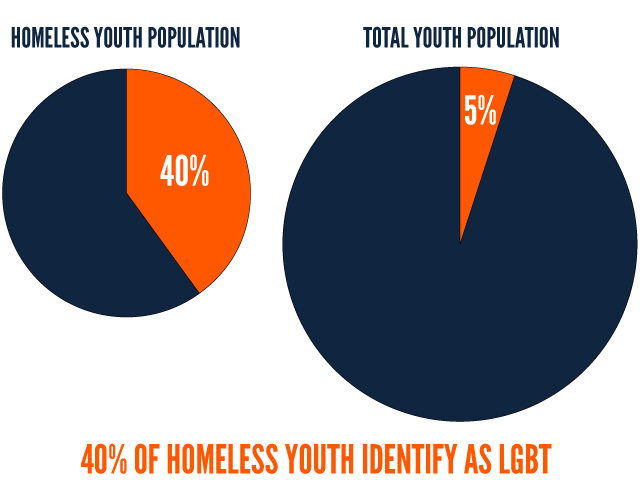
To make matters worse, the politicians that we would hope are leading the charge on these wins are simply riding their coattails. They claim victories that they had little or nothing to do with and have actually been counterproductive toward in the past. The very leaders we need to drive the fight forward are the same ones who would have us declare the war done. They are, if anything, more detrimental to the fight than the vocal opponents.
These are the fights we can’t forget about. These are the issues that we need to point to and realize that the war is far from won, that there is so much work left to be done. This was a good week. These were a lot of victories. Don’t expect every week to be like this.
It’s May, so it’s time to check the oil on just where I stand on the Political Compass:
Economic Left/Right: -9.38
Social Libertarian/Authoritarian: -8.46
Basically the same as last year, so just as cranky and disaffected as ever!
I think it’s safe to say at this point that sports hasn’t been exactly charitable to women, and that has been put on display time and time again recently. Yet for all the many high profile cases where various leagues and teams have completely failed women and their growing female fan bases, we tend to gloss over the various day-to-day miserableness that women who enjoy sports have to put up with.
Recently, I’ve started following a lot of people who talk hockey on Twitter, and the majority of those new follows are women. They’re smart, funny, and know their sport, as least as well as, and typically better than, their male peers. There’s probably an argument to be made that they do because they have to be better to be taken seriously, but I’m not even talking about bloggers here – just casual fans who are independently commenting on the sport that they love.
Most of these women I’ve started following because they said something intelligent about hockey. What keeps me around is that they’re, each and every one, pretty awesome people. Turns out most of them are passionate about other things I am passionate about, non-sports related things (please see the image at the top of the page for a random sampling). I tend to get a little mad when people I consider awesome are dumped on simply because of their plumbing.
Nearly three weeks ago, someone I respect on Twitter (despite the fact that she persists on rooting for the wrong team) called out a paid commentator of the team she roots for on yet another entry in his long documented history of being an absolute scumbag in his treatment of women. His response was, predictably, to cast himself as a victim and then double down on being awful.
I can imagine that there’s a temptation to look at the firestorm that ensued as a neutral observer and say “just a random fan getting into it with a shock jock,” but that’s not what it is. I say ‘is,’ because nearly three weeks on and it’s still going on, despite now being an entirely one-sided affair. Called on his awfulness, the commentator started by deflecting and claiming he was terribly wronged in a way that he was obviously not, and then very quickly ramped up to full-blown threats against her career in order to silence her.
Let me recap – A paid mouthpiece for a professional sports franchise overtly threatened a fan of that franchise with actions that could have lead to dramatic loss of income because she accurately pointed out he was being a misogynist bully. Can you guess what the reaction from that franchise was?
Oh, sorry, I left this box of crickets here.
Eventually, while not exactly concerned over the threats, she locked down her Twitter in order to remove herself from what was an unresolvable situation that was being tacitly supported by said franchise. But he was having none of that, preferring to mention her on Twitter in a manner akin to a third-grader playing “I’m not touching you!” Mind you, this is someone who has nearly 70,000 Twitter followers, many of whom “mobilized” on his behalf to back him up, horribly wounded victim that he is. He gets to amplify his signal many many times over to people willing to step into the fray for 30 seconds. While she has a number of people willing to actively defend her, the effort that they have to expend in defense is far and away more taxing than all of the offense combined. This is a gross power imbalance, and most of the people on the short side are already weary from having to deal with this kind of shit every day.
We’ve seen this type of behavior from various big-name GamerGate supporters who mobilize their flocks to anonymously peck at their targets while casting themselves as the real victims. The difference here is that, despite the distributed nature of GamerGate, there actually is a central authority to appeal to here – the team itself. Unfortunately, that team doesn’t seem to care. I’ve imagined they’ve done the math already and concluded that even passing acknowledgement of the issue would generate a backlash they don’t want to waste the time addressing. “So what if the commentator was harassing someone? He interviewed our favorite player and we like him!” This calculation effectively sells out 40% of their fanbase that, due to various social reasons, tend to be less vocal (and less heard when they are) in favor of not upsetting a rather small minority existing in the other 60%, a minority that gets shriller and more aggressive even as it grows smaller. Eventually that math is going to look very bad, but the damage is going to be long since done.